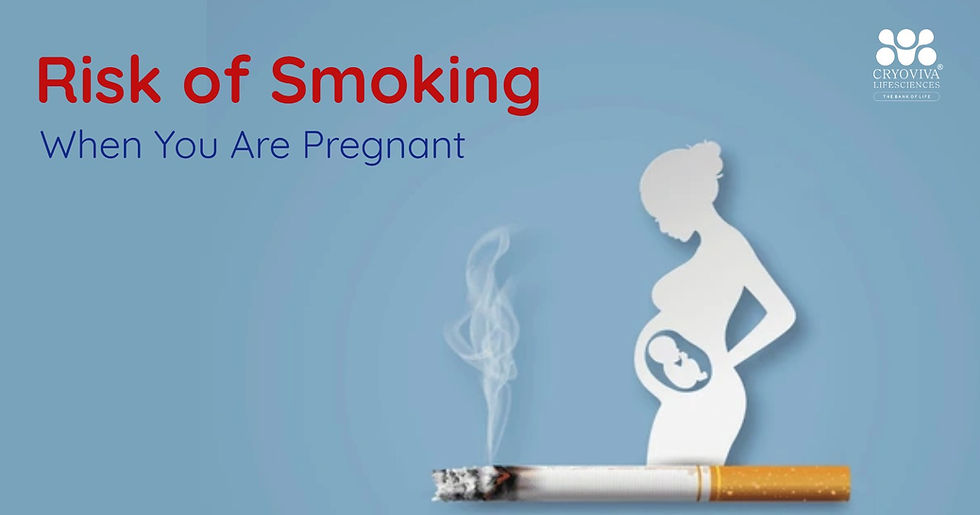Risk of Smoking When You Are Pregnant
- cryovivals
- Aug 19, 2025
- 4 min read

Smoking during pregnancy increases the risk of complications, including low birth weight and premature delivery, by up to 30 percent, according to the Centers for Disease Control and Prevention. This is not the kind of topic that allows for soft language or polite sidestepping. If you are pregnant and still smoking, or even occasionally reaching for a cigarette to manage the hormonal turbulence, the risk is not abstract. It is clinical. It is measurable. It shows up in the oxygen saturation levels, in the fetal growth charts, in the condition of the placenta that gets scanned and noted without much comment but always with consequence.
Smoking during pregnancy does not just introduce nicotine into your system. That would already be bad enough. It brings carbon monoxide, heavy metals, and over 4,000 toxic chemicals into a shared bloodstream. This is one that you and your developing fetus are both depending on. The placenta does not filter them out the way people like to imagine it does. The placenta is not a security gate. It is a transfer station. And it passes on almost everything you breathe, eat, or absorb.
What Actually Happens Inside the Body
When you smoke, oxygen transport is compromised. Carbon monoxide binds to hemoglobin more readily than oxygen does. So your blood carries less of what the baby needs and more of what causes oxidative stress. Over time, this creates an environment of chronic hypoxia. That is a clinical term for “not enough oxygen.” That one condition alone has been linked to low birth weight, intrauterine growth restriction, and abnormal development of the brain and lungs.
Nicotine, meanwhile, is a vasoconstrictor. It tightens blood vessels, including those in the uterus and placenta. This reduces nutrient flow, which can compromise fetal growth. It also raises maternal heart rate and blood pressure. That makes everything else harder to manage, from digestion to sleep to coping with normal pregnancy symptoms like dizziness and fatigue.
Miscarriage and Preterm Birth Risk
The risk of miscarriage increases significantly in smokers, especially in the first trimester when placental formation is still underway. Even light smoking, such as fewer than five cigarettes a day, is associated with earlier placental separation and higher incidence of preeclampsia.
The data is not unclear. Pregnant smokers are far more likely to deliver prematurely. That means increased risk of respiratory distress, NICU admission, and long-term developmental complications. And no, vaping is not a safe workaround. The aerosol still delivers nicotine and other harmful chemicals directly to your bloodstream. There is no safe nicotine delivery system when you are pregnant.
Passive Smoking Is Not Passive for the Baby
Living with a smoker, even if you are not lighting up yourself, increases the same risks. Secondhand smoke has been shown to raise the likelihood of stillbirth, low birth weight, and sudden infant death syndrome. Thirdhand smoke refers to the residue left on clothing, upholstery, and skin. It also carries risk. There is no safe buffer zone when it comes to nicotine exposure during gestation.
Quitting Is Not About Willpower. It Is About Strategy
If you are reading this and feeling defensive or overwhelmed, that is understandable. Pregnancy is a vulnerable time, and smoking often starts as a coping mechanism. It can feel like the only thing between you and full meltdown during those early weeks when the pregnancy symptoms are brutal and the emotional load is heavy.
But this is not about blame. It is about physiology. You are sharing a body now. And that means every inhalation counts.
Start by talking to your doctor. Not just about quitting, but about how. There are nicotine replacement therapies that are safer than cigarettes. There are cognitive behavioral approaches that do not require you to go cold turkey overnight. The earlier you start, the better the outcomes. It is never too late to improve the situation. You are not stuck.
What to Add to the Pregnancy To-Do List
Yes, it helps to add this to your pregnancy to do list, even if it feels like an emotional grenade. Include smoking cessation support as part of your first-trimester planning. Integrate it with your nutrition shifts, your prenatal supplement routine, and your mental health check-ins. Treat it like a piece of the whole picture, not an isolated habit that lives in shame.
A Final Note
You are not weak if you have not quit yet. But you are stronger than the chemical that is trying to stay in your bloodstream. And there is help, both medical and emotional, if you decide to move forward.
You are not just doing this for the baby. You are doing this for the version of you who wants to get to the other side of this pregnancy breathing easier. That is both literal and figurative. Pregnancy tips are everywhere. But this one is not a tip. It is a turning point.
And while you are taking the steps to protect this new life, you may also want to think ahead to what else you can preserve. Cord blood banking is not a futuristic idea anymore. It is a real, practical way to give your child a medical edge for decades to come. Cryoviva Life Sciences offers medically-backed, internationally certified stem cell preservation. It is one of those decisions that future-you will thank you for.
When you are building a safe beginning, do not stop at quitting cigarettes. Add protection for the future, too. Cryoviva is ready when you are.



Comments